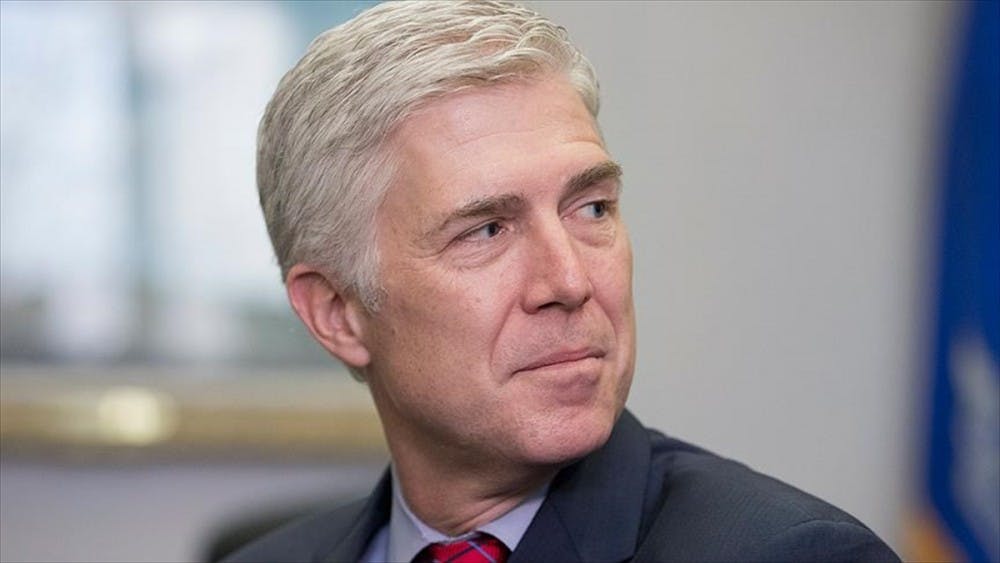Supreme Court nominee Neil Gorsuch was confirmed as a Supreme Court Justice by the Senate with a 54-45 vote yesterday over accusations of plagiarism in his book “The Future of Assisted Suicide and Euthanasia,” according to POLITICO. Gorsusch was accused of lifting sections almost verbatim from a 1984 article for the Indiana Law Journal for his 2006 book published by the Princeton University Press. Professor of jurisprudence and politics Robert P. George, who was the general editor of the series that included Gorsuch’s book, defended Gorsuch.
Given the timely nature of the allegations, George labeled them as politically-motivated attempts to derail Gorsuch's nomination.
“I can only say that their timing and substance (or, more to the point, lack of substance) makes it difficult to avoid the conclusion that this is a politically motivated effort to smear him in the hope of derailing his confirmation…” he wrote in an email in response to 'Prince' inquiry. George stated that the accusations are part of a long American political tradition since the late 1980s of “politics of personal destruction” wherein opponents have smeared Supreme Court nominees to derail their confirmation.
Ryan Chavez ’19, who is in George’s class, affirmed the prevalence of political partisanship that Professor George highlighted. Chavez is a columnist for the ‘Prince.’
“I think the confirmation process, at the current moment, a lot of it comes down to politics,” he said. The politicizing comes from both parties, he noted, citing how Merrick Garland, former President Obama’s Supreme Court nomination, did not get a hearing due to Republican obstructionism.
“I wouldn’t necessarily endorse Professor George’s view, but I think his analysis of where things are is very accurate. [The confirmation process] is so connected to the partisan division in this country,” said Chavez.
While Alis Yoo ’19 did not comment on Gorsuch’s alleged plagiarism, she noted the underlying resentment that has fueled the contention around Gorsuch’s nomination, namely the Republican refusal to consider Merrick Garland. Yoo is also in George’s class.
“I think an opposition to Gorsuch should and can only be rooted in the GOP’s unprecedented move to ignore a sitting president’s candidate,” Yoo said.

Regarding the substance of the plagiarism accusations, George noted that the infractions were technical, not conceptual.
“To me, the key thing is, Gorsuch did not attempt to steal other people’s intellectual property or pass off ideas and arguments taken from other writers as his own, nor did he seek credit for insights or analyses that weren’t his own,” George wrote.
George continued, “He was not trying to steal other people’s work or deceive readers by representing the insights and arguments of others as his own.”
He explained that the similarities between the texts illustrate, at best, that “[Gorsuch] was in a small number of cases a bit sloppy about paraphrasing and citation” and, at worst, “committed minor embarrassing (but certainly not disqualifying) infractions.”

However, POLITICO independently contacted six academics who have studied issues of academic integrity, and some of them took a harsher stance.
“Each of the individual incidents constitutes a violation of academic ethics. I've never seen a college plagiarism code that this would not be in violation of,” said Rebecca Moore Howard, a professor of writing and rhetoric at Syracuse University.
Elizabeth Berenguer, an associate law professor at Campbell Law School who teaches plagiarism and legal writing, said that Gorsuch’s book’s similarities to the 1987 paper would be considered a “potential violation of our plagiarism policy.”
“I would apply an academic writing standard,” said Berenguer. “Even if it were a legal opinion, it would be plagiarism under either.”
From George’s own undergraduate experience as a member of an academic discipline committee and later as a faculty member advising students under investigation for academic dishonesty, he suspected that Gorsuch would not have been suspended had he submitted his paper to the University.
“I suspect that, at most, a disciplinary committee…would issue a reprimand rather than suspend the student or impose any harsher punishment," George wrote.
Chavez, however, was not sure.
“I think any allegation of plagiarism is a serious issue, particularly in an academic context,” he said. “If [he] submitted this to the committee on academic integrity, would Gorsuch be suspended for several years? Princeton is quite particular in how it handles issues of plagiarism, and for good reason.”
After a nearly 14-month vacancy on the bench, Gorsuch’s lifetime appointment to the court will begin after his swearing in on Monday.








